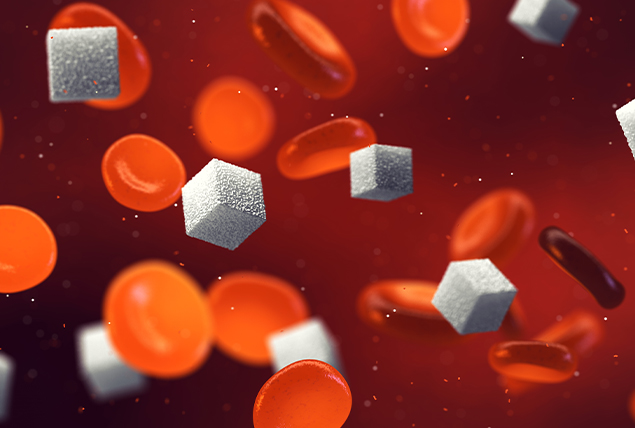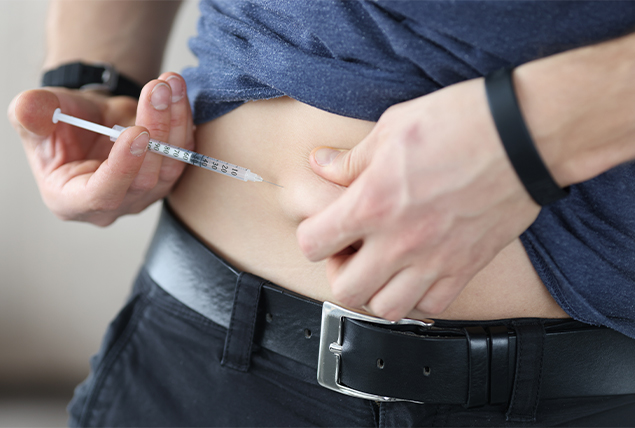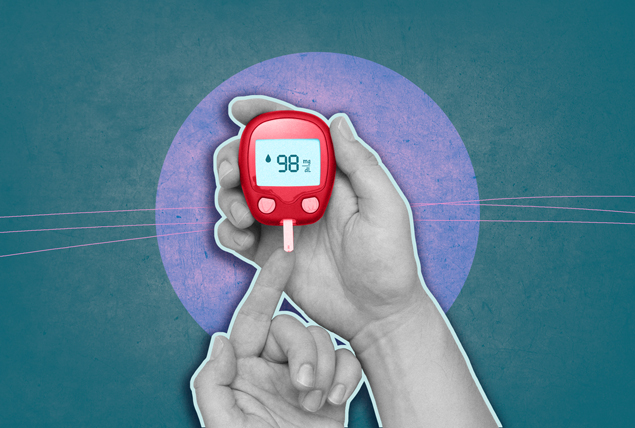What Is Hyperglycemia and How Do You Know If You Have It?

Hyperglycemia is the medical term for high blood sugar or high blood glucose. This occurs if your body has too little insulin, a hormone produced by the pancreas, or if you have insulin resistance, which prevents your body from effectively using insulin.
What is hyperglycemia?
Hyperglycemia typically indicates the presence of diabetes. Hyperglycemia can also result from skipping medications, not using enough insulin or taking insufficient amounts of other blood sugar-lowering drugs.
Treatment of hyperglycemia is critical.
Hyperglycemia can worsen and lead to major health issues that necessitate emergency care if left untreated. Even mild hyperglycemia that persists can cause issues with your heart, kidneys, eyes, nerves and nervous system.
"Essentially, hyperglycemia means your blood sugar is outside of a normal range," said Marshall J. Bouldin, M.D., the chief medical officer, vice chairman and co-founder of Vigilant Health in Ridgeland, Mississippi.
"And if your brain doesn't have it in that range, then you're not going to live very long," he said. "It's a necessity of life."
What are the risks and causes of hyperglycemia?
People with diabetes are most frequently affected by hyperglycemia.
There are two types of diabetes:
- Type 1 diabetes, or when your body doesn't produce enough insulin
- Type 2 diabetes, or when you have insulin resistance, or your cells aren't using insulin efficiently.
For people with diabetes, hyperglycemia can be triggered by the following factors:
- Eating excessive amounts of food
- Not getting enough exercise
- Not taking enough insulin or other medications that regulate blood glucose
Hyperglycemia may also be caused by the following:
- Medications, such as beta-blockers, corticosteroids, diuretics and epinephrine
- Conditions that directly impact the pancreas, or where insulin is produced
- Conditions that can cause insulin resistance, such as Cushing's syndrome (when your body makes too much cortisol) and acromegaly (when your body makes too much growth hormone)
- Too much stress
- Being pregnant
"Because blood sugar has to be within a certain range, the balance can be perturbed when you get really sick," Bouldin said.
"So almost any illness that gets severe enough can produce hyperglycemia. But it only produces it transiently while that illness is in its acute phase, and then it will restore it."
Examples of conditions that can cause hyperglycemia include sepsis, an infection in the bloodstream, liver failure and physical stress situations.
"A near-death experience where you are critically ill, you can see hyperglycemia," he added. "You can even get hyperglycemia with mild infections."
Are there stages of hyperglycemia?
Unlike other health conditions, there aren't any stages or phases of hyperglycemia. Why? There are no stages of hyperglycemia because blood sugar varies at different times of the day, according to Bouldin.
"If you have a blood sugar of 150 mg/dL and we just went out to the steakhouse and came back home and you're still at 150 mg/dL, there's nothing wrong with you. That's what it ought to be."
"But if you wake up with 150 mg/dL, you're in trouble. To me, it's simple enough, if you're under 100 mg/dL fasting, then you're normal. If you're 100 to 125 then you have prediabetes," Bouldin said.
It's estimated that 40 percent of Americans have prediabetes. That is, they're on the path to diabetes.
"The next level is a fasting level of 126, which is where you diagnose diabetes. The mg/dLmg/dL that corresponds to that is 6.5."
What are the symptoms of hyperglycemia?
The most common signs and symptoms of hyperglycemia include the following:
- Frequent urination
- High blood glucose
- High levels of glucose in the urine
- Increased thirst
Blurred vision and feeling weak or unusually tired are early symptoms that may indicate hyperglycemia.
"The classic signs of diabetes are polyuria, polydipsia and polyphagia, which is excess hunger, excess urination and excess thirst," said Paul Pavlov, M.D., a family doctor at North Bay Family Medical Clinic in Biloxi, Mississippi.
"But the main thing you see with hyperglycemia is polydipsia and polyuria. That means getting up to pee at night four or five times," Pavlov said.
Checking your blood sugar is a necessary part of controlling your diabetes. Pavlov noted that most of his diabetic patients have home glucose monitors so they can check their blood sugar levels frequently.
"People who are hyperglycemic drink a lot," Bouldin said. "They're forced to drink a lot because they're peeing so much because they can't control it. And so, they have this incredible thirst and literally drink pitchers of water."
"Oddly enough, the individual with that problem is seldom self-aware. They don't see it as abnormal because they get into it so slowly. Another more subtle symptom is fatigue and being tired. It comes on after the sugars get very, very high," Boudin said.
Fetal hyperglycemia—what happens if you're pregnant?
Hyperglycemia in pregnancy—known as fetal hyperglycemia or gestational hyperglycemia—is a result of either pre-existing diabetes or insulin resistance developed during pregnancy. Excess weight before a pregnancy can also play a role.
During pregnancy, hormone levels change, and sometimes make it harder for your body to process blood sugar efficiently, causing blood sugar to rise, resulting in gestational diabetes.
High blood glucose levels during pregnancy can increase the chance that your baby will be born prematurely, weigh too much or have breathing issues or low blood glucose immediately after birth.
Fetal hyperglycemia can also increase the risk of miscarriage or having a stillborn baby
Diet and exercise are the easiest ways to manage your blood sugar levels, but if they’re not enough, your healthcare provider may recommend insulin injections to lower your blood sugar. Some doctors may prescribe oral medication to better manage blood sugar levels.
Facts 'n' stats about hyperglycemia
- Hyperglycemia is defined as blood sugar greater than 125 mg/dL while fasting and above 180 mg/dL two hours postprandial (occurring after a meal).
- A patient has prediabetes with a fasting glucose level of 100 mg/dL to 125 mg/dL.
- There were an estimated 38.4 million Americans with diabetes in 2021, according to the American Diabetes Association. Roughly 352,000 Americans under age 20 have diabetes.
- Of the total number of people with diabetes, it was estimated that 8.5 million were undiagnosed.
- Currently, 1.4 million people in the United States are diagnosed with diabetes every year.
- The number of people with diabetes in the world increased from 108 million in 1980 to 422 million in 2014, according to the World Health Organization.
How do you diagnose hyperglycemia?
When your blood sugar levels are abnormal, your healthcare provider will typically diagnose you for insulin resistance, prediabetes or diabetes.
Hemoglobin A1C test—or HbA1c or the A1C—is a simple blood test measuring your average blood sugar levels over the past three months.
Your A1C result indicates as follows:
- Less than 5.7 percent: Normal
- 5.7 to 6.4 percent: Prediabetes
- Greater than 6.5 percent: Diabetes
If your A1C is greater than 6.5 percent on two or more occasions, you most likely have diabetes.
"The test essentially shows how much blood sugar is diffused into a red blood cell over a period of time," Pavlov said. "It doesn't change from day-to-day or week-to-week but month-to-month. That's why you check them every three months."
What are the complications and related conditions of hyperglycemia?
Long-term hyperglycemia can damage the nerves in two main ways:
- Autonomic neuropathy: This has an impact on bodily functions that are autonomic, including digestion, libido and sexual function.
- Peripheral neuropathy: This causes numbness, tingling or weakness in the hands and feet due to nerve injury.
The long term complications of diabetes can be devastating. Those who have diabetes and routinely have high blood sugar levels may develop diabetic retinopathy. Due to the injury to the blood vessels in the rear of the eye, vision loss may result.
"One of the most common, terrible end results of diabetes that's uncontrolled is going blind from diabetic retinopathy," Bouldin said.
What is the care plan on hyperglycemia?
If a person does not address severe hyperglycemia, they may develop diabetic ketoacidosis (DKA), a potentially fatal condition.
This is most common in people who have type 1 diabetes.
Cells become less responsive to insulin in diabetics who do not take action to control their blood sugar levels. The body turns to fats for energy when there is not enough insulin in the system or when the cells do not react, preventing glucose from entering the cells.
Your healthcare professional will help you devise a plan to control your diabetes. Regular physical activity, medication, and a diabetic eating plan are a few things that can help you get your blood sugar back on track. Speak to your doctor to learn more.
The bottom line
If you have signs of hyperglycemia, don't wait to see a doctor. Whether you have diabetes, are pregnant, or are experiencing the symptoms of hyperglycemia, schedule an appointment with your doctor to avoid complications.


















